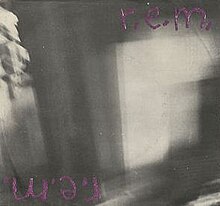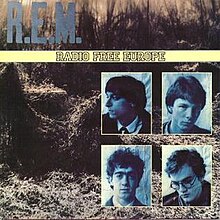Radio Free Europe (song)
| "Radio Free Europe" | ||||||||
|---|---|---|---|---|---|---|---|---|
 |
||||||||
| Single by R.E.M. | ||||||||
| B-side | "Sitting Still" | |||||||
| Released | July 8, 1981 | |||||||
| Format | 7" | |||||||
| Recorded | 1981 at Drive-In Studios in Winston-Salem, North Carolina, United States | |||||||
| Genre | Alternative rock | |||||||
| Length | 3:46 | |||||||
| Label | Hib-Tone | |||||||
| Writer(s) | Bill Berry, Peter Buck, Mike Mills, and Michael Stipe | |||||||
| Producer(s) | Mitch Easter | |||||||
| R.E.M. singles chronology | ||||||||
|
||||||||
|
||||||||
| "Radio Free Europe" | ||||
|---|---|---|---|---|
 |
||||
| Single by R.E.M. | ||||
| from the album Murmur | ||||
| B-side | "There She Goes Again" | |||
| Released | July 8, 1983 | |||
| Format | 7", 12", cassette | |||
| Recorded | January 6 – February 23, 1983, Reflection Studios, Charlotte, North Carolina, United States | |||
| Genre | Alternative rock | |||
| Length | 4:06 | |||
| Label | I.R.S. | |||
| Writer(s) | Bill Berry, Peter Buck, Mike Mills, and Michael Stipe | |||
| Producer(s) | Don Dixon and Mitch Easter | |||
| R.E.M. singles chronology | ||||
|
||||
"Radio Free Europe" is a song by the American alternative rock band R.E.M., released in 1981 as the band's first single. A re-recorded version, appeared on their 1983 debut album.
"Radio Free Europe" was released as R.E.M.'s debut single on the short-lived independent record label Hib-Tone in 1981. The song features "what were to become the trademark unintelligible lyrics which have distinguished R.E.M.'s work ever since." The single received critical acclaim, and its success earned the band a record deal with I.R.S. Records. R.E.M. re-recorded the song for its 1983 debut album Murmur. The re-recording for I.R.S. became the group's first charting single, peaking at number 78 on the Billboard Hot 100 chart. The song is ranked number 389 on Rolling Stone list of The 500 Greatest Songs of All Time. In 2010, it was added to the Library of Congress's National Recording Registry for setting "the pattern for later indie rock releases by breaking through on college radio in the face of mainstream radio's general indifference." The song was featured in the 1984 movie The Party Animal.
R.E.M. formed in Athens, Georgia in 1980. The band quickly established itself in the local scene. Over the course of 1980 the band refined its songwriting skills, helped by its frequent gigs at local venues. One of the group's newer compositions was "Radio Free Europe". The other members of the band were reportedly awestruck when they heard the lyrics and melodies singer Michael Stipe had written for the song. By May 1981 the band added "Radio Free Europe" to its setlist.
After a successful show opening for The Police, R.E.M. intended to record material for a demo tape. The group traveled to Drive-In Studios in Winston-Salem, North Carolina, to record some songs with producer Mitch Easter, who was a member of the band Let's Active. The band recorded "Radio Free Europe", "Sitting Still", and the instrumental song "White Tornado", which were placed on a promotional cassette tape. The band sent out 400 copies, one of which was received by Atlanta law student Jonny Hibbert. Hibbert offered to release "Radio Free Europe" and "Sitting Still" as a one-off 7" vinyl single with the understanding that he would own the publishing rights for both songs; the band agreed to his terms. However, Hibbert felt the recording was unsatisfactory, and oversaw a remix. Easter said he found the presence of Hibbert "distracting" and added, "He came into my studio and it was like, now the big city guy is going to do it right. We mixed the song for about 12 hours and really, there wasn't enough equipment to warrant more than 45 minutes." The final mastering of the song disappointed the band. Guitarist Peter Buck, who described the recording years later as "muddy and hi-end", expressed his displeasure by breaking a copy of the finished single and nailing it to his wall. However, Buck admitted that "there's something to be said for the original sort of murky feeling for [the original recording]".
...
Wikipedia
